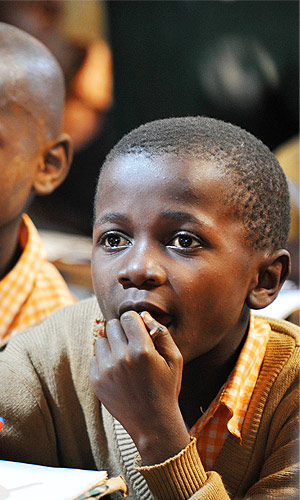|
 |
|
LOOKING INTO THE FUTURE: Students take a lesson in a slum district in Nairobi, Kenya, on July 21, 2010. A recent UN report on the progress toward the Millennium Development Goals showed children's educational conditions in many of the world's poorest countries, especially sub-Saharan countries, have greatly improved (ZHAO YINGQUAN) |
"The rich will do anything for the poor but get off their backs." At least that is what Karl Marx, the 19th century revolutionary German philosopher once said. Considering the outcome of a high-level summit on issues related to poverty and development, held at the UN headquarters in New York from September 20-22, it seems that Marx's reflection on the conflict of economic and political interests of the haves and have-nots remains valid.
At the three-day UN summit on the Millennium Development Goals (MDGs), world leaders renewed the pledge they made 10 years ago to take drastic action to eliminate poverty, illiteracy, deadly diseases and environmental degradation.
In doing so, however, they acknowledged that they have largely failed to meet their words with deeds in the past 10 years. They did promise to do more in the next five years to meet all the targets they initially set for 2015.
Promises to keep
Like in the past, developed countries faced severe criticism for failing to honor their commitments to fund development in the world's poorest countries, which continue to suffer from hunger, illness, illiteracy and environmental disasters on a massive scale.
During his speech at the summit, Jorge Valero, Venezuela's envoy to the UN, said most developed countries have not fulfilled the commitment to allocating 0.7 percent of their gross national income to official development assistance (ODA).
Like many others who spoke at the meeting, Valero thinks poverty and inequality in many parts of the world are on the rise as a result of the current global economic crisis. This is happening despite significant gains made in the past few years, in terms of achieving the MDGs.
The MDGs include a 50-percent reduction in extreme poverty and hunger, universal primary education, reduction of child mortality by two thirds and maternal mortality by three quarters, the promotion of gender equality and the reversal of the spread of HIV/AIDS, malaria and other deadly diseases, all by 2015.
"The financial economy exercises hegemony in the world and increases the accumulation of billions of dollars without creating any good," Valero told delegates. "It is the casino economy. It...intends to destroy the public sphere, privatizing everything from the public service to war."
At the summit, high representatives from many other developing countries seemed to hold similar views about the performance of developed countries, in terms of providing funds for development. They stressed the need for greater cooperation among developing countries to help meet targets for poverty reduction, improvement in the literacy rate and an increase in environmental preservation in the next five years.
For their part, the high representatives of developed countries, which are mainly dominated by the EU and the United States, reaffirmed their support for achieving the MDGs' targets. As many observers noted, however, they did so in a very vague, ambiguous way.
"I have made it clear that the United States will do our part," said U.S. President Barack Obama at the summit. "My national security strategy recognizes development as not only a moral imperative, but a strategic and economic imperative."
Obama's take on his nation's increased engagement in international development initiatives may be a sign of optimism for some proponents of sustainable development, but there are others who think it is nothing more than empty words, devoid of substance.
"I am announcing our new U.S. Global Development Policy," said Obama during his speech at the UN. "It's rooted in America's enduring commitment to the dignity and potential of every human being...The United States is changing the way we do business."
When asked to express her thoughts on this subject, Mercedes Gallego, a Spanish journalist who covered the Iraq war and keeps a keen eye on international affairs, told this correspondent: "To tell you the truth, I don't understand what this development policy is all about."
At the end of the summit, all the UN member states signed a 31-page outcome document that reiterated world leaders' previous promises to achieve all the MDGs by 2015.
| 